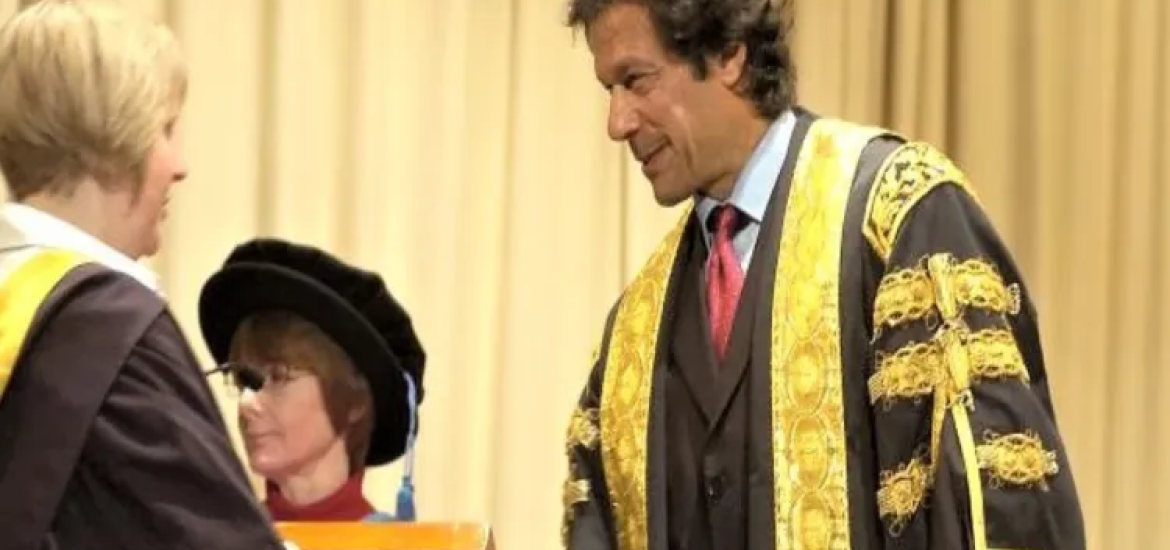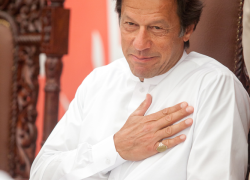Why does Imran Khan want to become Chancellor of Oxford University?
Introduction
Imran Khan, the former Prime Minister of Pakistan and founder of the Pakistan Tehreek-e-Insaf (PTI) party, has recently made headlines with his intention to run for the prestigious position of Chancellor at Oxford University, despite being incarcerated. This decision has sparked widespread interest and speculation, given the high-profile nature of the role and Khan's current legal and political challenges. Understanding why Khan would pursue such a position requires a nuanced exploration of his personal history, his connection to Oxford, his political objectives, and the broader context of his career.
Imran Khan’s Connection to Oxford University
Imran Khan's relationship with Oxford University is both personal and profound. He attended Keble College at Oxford, where he earned a degree in Philosophy, Politics, and Economics (PPE). His time at Oxford was formative, shaping his intellectual and social perspectives and providing him with a global outlook that later influenced his political career. The PPE degree is particularly notable, as it has been a traditional stepping stone for many influential leaders and thinkers worldwide.
Khan's Oxford experience likely played a significant role in shaping his identity, giving him access to an elite network and reinforcing his belief in the importance of education and leadership. His connection to Oxford is not merely academic; it represents a critical phase in his development as a leader, both in Pakistan and on the global stage. Serving as Chancellor of Oxford would be a natural extension of this relationship, allowing him to remain connected to an institution that has had a lasting impact on his life.
Personal Ambition and Legacy
One of the primary reasons Imran Khan may wish to become Chancellor of Oxford University is the desire to cement his legacy. Throughout his life, Khan has pursued excellence in various fields, from his illustrious cricket career to his philanthropic efforts and political leadership. His ambition has always been to make a lasting impact, both in Pakistan and globally.
Becoming Chancellor of Oxford University would be a crowning achievement in this regard. It would place him in a prestigious role at one of the world's leading academic institutions, further solidifying his status as a global leader. This position would allow him to influence the next generation of leaders and thinkers, something that aligns with his lifelong commitment to education and leadership development.
Moreover, Khan's decision to run for Chancellor while incarcerated adds a layer of complexity to his ambition. It demonstrates his resilience and determination to continue contributing to global discourse, even in the face of adversity. This move could be seen as an attempt to rise above his current legal and political challenges, positioning himself as a figure of strength and integrity who remains committed to his principles despite significant obstacles.
Political Strategy and Global Perception
Imran Khan's decision to run for Chancellor of Oxford University is also likely driven by strategic political considerations. As a seasoned politician, Khan is acutely aware of the importance of maintaining visibility and relevance, especially during times of political turmoil. His bid for the Chancellorship could be a calculated move to keep his name in the international spotlight and to reinforce his narrative as a leader who is unjustly persecuted by the state.
By pursuing a prestigious international position, Khan can draw attention to his legal battles in Pakistan and frame them within a broader context of political repression. This narrative could resonate with his supporters and sympathizers, both in Pakistan and abroad, who see him as a victim of a corrupt system. Running for Chancellor allows him to leverage his global profile to garner support and sympathy, potentially influencing public opinion and diplomatic relations.
Furthermore, Khan's candidacy could serve as a form of soft power diplomacy. By engaging with a respected institution like Oxford, Khan could bolster his international credentials and build alliances with influential figures in academia, politics, and business. This could be particularly valuable if he intends to continue playing a role in global affairs, whether as a political leader, an activist, or a thought leader.
Symbolism and Public Perception
The symbolism of Imran Khan running for Chancellor of Oxford University from jail cannot be overlooked. This move is a powerful statement about his resilience and determination to fight for his beliefs, regardless of the circumstances. It underscores his commitment to leadership and excellence, even in the face of significant personal and political challenges.
For Khan's supporters, this candidacy is likely to be seen as a testament to his strength of character and his refusal to be silenced by his detractors. It reinforces the image of Khan as a leader who is willing to take on formidable challenges and who remains undeterred by adversity. This narrative could be particularly compelling for younger generations, who may be inspired by Khan's example of perseverance and dedication to his principles.
On the other hand, critics might view Khan's candidacy as a distraction from his legal troubles or as an attempt to shift focus away from the challenges facing Pakistan. However, Khan's decision to pursue the Chancellorship could also be interpreted as an effort to engage with the global community in a meaningful way, despite the constraints imposed by his current situation. By running for a position that is largely symbolic but highly prestigious, Khan is signaling that he remains a relevant and influential figure on the world stage.
Contribution to Education and Leadership
Another important factor in Imran Khan's decision to run for Chancellor of Oxford University is his longstanding commitment to education and leadership development. Khan has always been an advocate for education, as evidenced by his establishment of Namal University and the Shaukat Khanum Memorial Cancer Hospital & Research Centre in Pakistan. He believes in the transformative power of education and has consistently emphasized the need for quality education to uplift communities and drive social change.
As Chancellor of Oxford University, Khan would be in a position to influence one of the world's leading educational institutions. This role would allow him to contribute to the university's mission of fostering intellectual growth and innovation. Khan could use his platform to advocate for educational reforms, promote access to education for underprivileged communities, and support initiatives that align with his vision of social justice and equality.
Additionally, Khan's leadership experience, both in politics and philanthropy, would bring a unique perspective to the role of Chancellor. He understands the challenges of governance and administration, as well as the importance of ethical leadership. His tenure as Chancellor could provide valuable insights into how academic institutions can play a role in addressing global challenges, such as poverty, inequality, and climate change.
Challenges and Potential Criticism
While there are several compelling reasons for Imran Khan to pursue the Chancellorship of Oxford University, his candidacy is not without challenges. One of the primary obstacles is his current legal situation. Running for such a prestigious position while incarcerated may raise questions about his ability to fulfill the responsibilities of the role. Critics may argue that his focus should be on resolving his legal issues and addressing the political situation in Pakistan, rather than pursuing an international academic position.
Furthermore, Khan's candidacy could be met with skepticism from some quarters within Oxford University and the broader academic community. The position of Chancellor, while largely ceremonial, carries significant symbolic weight. Some may question whether Khan's political background and legal troubles make him a suitable candidate for the role. There could be concerns about the potential politicization of the position and the impact it might have on the university's reputation.
Another potential challenge is the competition Khan would face from other high-profile candidates. The Telegraph has reported that former UK Prime Ministers Sir Tony Blair and Boris Johnson are among those who may be in the running for the position. These individuals have strong ties to the UK political establishment and are likely to have significant support within the university and beyond. Khan's chances of winning may be slim in the face of such formidable competition.
Conclusion
Imran Khan's decision to run for Chancellor of Oxford University from jail is a multifaceted and strategically significant move. It reflects his deep connection to Oxford, his ambition to leave a lasting legacy, and his commitment to education and leadership. At the same time, it serves as a political strategy to maintain his visibility and relevance on the global stage, despite the challenges he faces in Pakistan.
Khan's candidacy is a powerful statement of resilience and determination, symbolizing his refusal to be silenced by adversity. However, it also presents challenges and potential criticism, particularly regarding his legal situation and the competition he faces.
Ultimately, Khan's bid for the Chancellorship of Oxford University underscores his belief in the importance of leadership, education, and global engagement. Whether or not he is successful in his candidacy, his decision to run is likely to have a lasting impact on his legacy and on the public perception of his role as a global leader.















